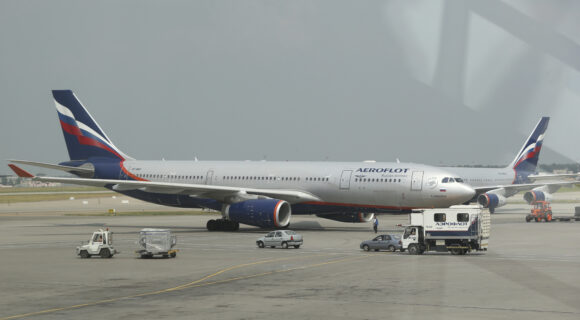The opening salvos have been fired in a 2.5 billion euro ($2.7 billion), Irish court battle between some of the world’s largest aircraft lessors and their insurers over around 80 jets stranded in Russia.
Dublin’s High Court earlier this month began to hear the case that lawyers involved expect to take many months.
Here are the main arguments laid out by the two sides:
ARE THE PLANES LOST?
Lessors wrote off billions of euros from their balance sheets after Russian airlines failed to return their aircraft and they say there is no real prospect of recovery. But some insurers argue the jets might be returned in the future and that lessors have suffered a “paper loss” rather than a “physical loss.”
Insurers argue the lawsuits are premature and have pointed to lessors’ settlements with Russia over some of the trapped jets, which have totalled more than $2.5 billion to date.
WHAT CAUSED THE LOSS?
A central point in the case is whether the actions of the Russian government were the principal cause of the failure by airlines to return the planes or whether the desire of the airlines to retain possession played a part.
That could determine whether claims should be made under the narrower “war risk” or broader “all risks” policies and whether a valid claim can be made under either policy at all, lawyers said.
WHEN DID THE LOSSES BEGIN?
Insurers’ notices withdrawing war-risk cover for Russia began to take effect from March 8. But a lawyer representing lessors said clients were already in the “grip of the peril” before this date, arguing that the loss had already effectively occurred.
Lessors point to their mostly fruitless attempts to repossess the planes, that began as soon as EU sanctions were adopted on Feb. 25, 2022. Lawyers for some of the insurers have accused the plaintiffs of failing to specify a date when the loss occurred.
WHAT ARE THE RELEVANT INSURANCE POLICIES?
Lawyers for insurers argued that if a loss occurred, the primary relevant insurance policy is that held by the airline leasing the aircraft and that any claim should be made with those, mainly Russian, insurers.
Lessors argue that their efforts to secure claims under those policies have failed, but insurers in the case counter that this route is far from exhausted.
Lessors say their claims should be paid under “contingent cover” that they say should step in if policies held by the Russian airlines fail to pay out. They have also suggested claims could come under “possessed cover,” which covers risks during repossession of an aircraft.
($1 = 0.9363 euros)
(Reporting by Conor Humphries and Padraic Halpin; editing by Barbara Lewis)
Photograph: An Aeroflot Airbus A330 aircraft prepared for flight at Sheremetyevo airport in Moscow, on June 27, 2013. (AP Photo/Sergei Grits, File)
Related:
- Details of Aviation Lessor Settlements With Russia Over Trapped Planes
- Multibillion-Euro Court Battle Over Stranded Russian Jets Begins in Dublin
- UK Court Decides Aircraft Disputes to Be Heard in Ukraine, Not London
- Irish Court Case on Russia Jet Insurance Claims to Begin on June 11
- UK Court Rules That $10 Billion Jet Dispute Should Be Heard in London, Not Moscow
Topics Russia
Was this article valuable?
Here are more articles you may enjoy.



 ‘Structural Shift’ Occurring in California Surplus Lines
‘Structural Shift’ Occurring in California Surplus Lines  Trump’s Repeal of Climate Rule Opens a ‘New Front’ for Litigation
Trump’s Repeal of Climate Rule Opens a ‘New Front’ for Litigation  Portugal Deadly Floods Force Evacuations, Collapse Main Highway
Portugal Deadly Floods Force Evacuations, Collapse Main Highway  Fingerprints, Background Checks for Florida Insurance Execs, Directors, Stockholders?
Fingerprints, Background Checks for Florida Insurance Execs, Directors, Stockholders? 

